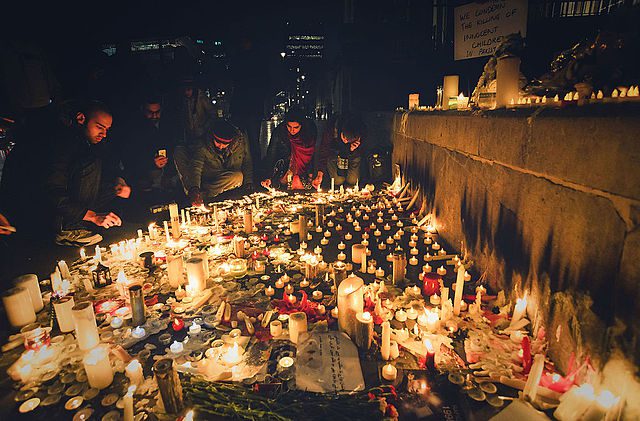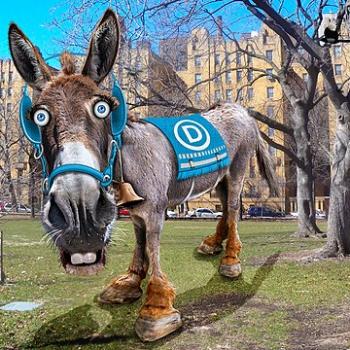What frosts me about things like this is the fundamental irrationality of taking one act as if it supposedly “proves” something about huge groups of people. Obviously it doesn’t at all. Such a mentality exhibits the classic sweeping, stereotypical hallmark of prejudicial or bigoted thought. We live in an age of subjectivism and opposition to solid logical, coherent thought. So now Christians are to be characterized as mass murderers because of Oslo fanatic Anders Behring Breivik (just like Hitler was supposedly a good Catholic and Stalin, Eastern Orthodox)? The guy is a neo-Nazi fascist!
Likewise, there were attempts to characterize Christians or particularly politically conservative ones, as terrorists, after Timothy McVeigh and that lunatic in Arizona (Jared Loughner). It doesn’t work. None of these evil murderers remotely fit into the objective profile of the groups that are lambasted as a result of them. Even if they did, it would prove exactly nothing, as to whole groups, anyway. It simply doesn’t follow. Sheer evil of such a profound level is sui generis (“one of a kind”) anyway. It makes little sense to try to place a heartless, soul-dead monster like that within any larger human group of more or less “normal” people (fallen though we all are).
So many people, despite these rather obvious considerations, base opinions on famous and notorious “public” acts that become highly “symbolic” to them. Hence, when Rev. Martin Luther King was murdered in 1968 (I visited the spot where it happened, in 2009, along with several other notable King sites: his house, church, the place of his last speech), it was taken as proof that America remained fundamentally racist at its core; even institutionally or “systemically” so. It proved no such thing; all it “proved” was the fact that one racist who hated Dr. King managed to kill him. There are always some racists around. The dispute is how many they are and whether it is the norm and consensus in any given society.
But the entire civil rights movement came to a halt for several years; even the great soul music out of Memphis died a quick death, as a result. Steve Cropper, the white guitarist at Stax studios in Memphis, who had played on and written and produced so many of those songs, has noted how he was treated with hostility in the studio after King’s murder, as if he had anything to do with it. One readily understands the overwhelming grief and despair, as a result of a great leader having been cut down (America had gone through JFK, after all), but there has to be some limit to applying the natural negative emotional reaction to those who were disconnected in every immediate sense except for the mere coincidence of a skin color.
Then when Obama was elected, America supposedly “proved” it wasn’t racist anymore. I think his election did positively indicate less racism in our country, but racists and racism had long since been rightly marginalized and demonized, according to any serious polling data for the previous 30 years at least. Yet the symbolic phenomenon of Obama’s election supposedly “proved” a sudden sea change. Now that many are opposing his policies (not his skin color!), unfortunately we’re back to the obligatory “groupthink” charges of racism again. To make a strong protest against any of his policies is to be a racist. I guess, then, the country still suffers from the annoying tendency of the race card being played at every opportunity, no matter how irrelevant it is. I am sick to death of it.
If we are truly colorblind, we criticize people of color precisely because race is no longer an issue, and they are treated the same: both in a positive sense and a negative sense of criticism of their governing policy or whatever else is the topic at hand. We (i.e., us white folks) don’t — or shouldn’t — treat African-Americans with kid gloves out of a perverse application of “corporate white guilt” when it is irrelevant. That is what is patronizing and condescending: as if they wouldn’t be able to take criticism because of being so inferior and ill-equipped.
President Obama is a politician, period; thus open to critique like any other politician. If proof that white America has gotten past skin color was needed, it was amply provided in 2008: so much so that Jesse Jackson openly cried in Chicago on election night. It meant something very significant. But formerly widely racist white America hadn’t changed overnight. It was a long process.
I’ve been an avid student of race relations as a native Detroiter and sociology major, for over 40 years: since the Detroit Riots of 1967.
The problem is this sort of thoroughly subjective thinking, which is detached from serious analytical, properly reflective thought. I posted on my Facebook page a link to a great article about the Norway massacre by Chuck Colson. He is rational, and shows that rejection of Christianity is no answer, and will exacerbate the problem, not resolve it. But people are sheep . . .All we can do is try to keep important societal conversations on a rational plane, influenced by our own Christian viewpoints. And it is not rational to make conclusions about groups of many millions of people, based on the evil acts of one psychopath.
The Character Assassination of Robert Spencer (David Horowitz)
Norway Attacks: ‘Breivik Acted Alone’ (BBC News Europe)
Spencer vs. Alan Colmes on Norway Smears (video clip)


















